

Reflecting on the ethics of long-term imprisonment. Ben Jarman, a Quaker at Westminster Local Meeting, has worked in prisons for years.

What has the experience taught him, and how has his Quaker faith shaped his outlook? I first became interested in prisons eight years ago while working at the Quaker Council for European Affairs. Ethics of Punishment Flashcards. Court specialization. Specialization Organizations specialize their labor to increase productivity.
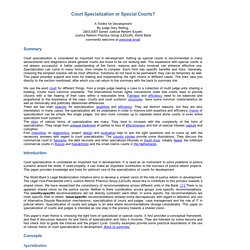
How to Become a Prison Warden. Becoming a Prison Warden A prison warden is the most senior position at a correctional institution.
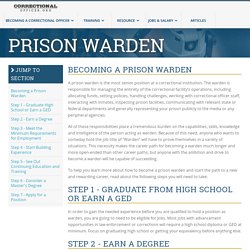
The warden is responsible for managing the entirety of the correctional facility’s operations, including allocating funds, setting policies, handling challenges, working with correctional officer staff, interacting with inmates, inspecting prison facilities, communicating with relevant state or federal departments and generally representing your prison publicly to the media or any peripheral agencies.
201707522000. Juvenile Detention - Child Trends. WMD. Home. Tresspassing legal definition of Tresspassing. An unlawful intrusion that interferes with one's person or property.
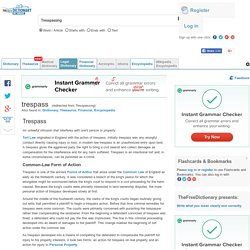
Tort Law originated in England with the action of trespass. Initially trespass was any wrongful conduct directly causing injury or loss; in modern law trespass is an unauthorized entry upon land. History of Fingerprints. 1858 - Sir William Herschel, British Administrator in District in India, requires fingerprint and signatures on civil contracts.

Suicide by cop - Wikipedia. Suicide by police is a suicide method in which a suicidal individual deliberately behaves in a threatening manner, with intent to provoke a lethal response from a public safety or law enforcement officer.[1] Overview[edit]
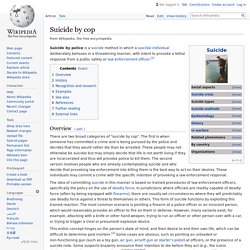
Taser training at the St. Clair County Corrections academy. Jdcap directory201008. What Are Your Miranda Rights? The wording used when a person is read the Miranda Warning, also known as being ‘Mirandized,’ is clear and direct: “You have the right to remain silent.

Ethical Dilemmas In Prison And Jail Health Care. Editor’s note: This post is published in conjunction with the March issue of Health Affairs, which features a cluster of articles on jails and health.
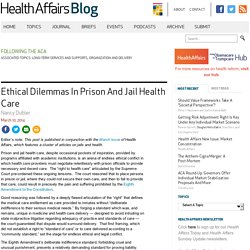
Prison and jail health care, despite occasional pockets of inspiration, provided by programs affiliated with academic institutions, is an arena of endless ethical conflict in which health care providers must negotiate relentlessly with prison officials to provide necessary and decent care. The “right to health care” articulated by the Supreme Court pre-ordained these ongoing tensions. Court Role and Structure. The federal judiciary operates separately from the executive and legislative branches, but often works with them as the Constitution requires.
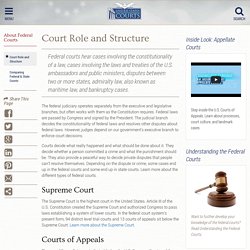
Federal laws are passed by Congress and signed by the President. The judicial branch decides the constitutionality of federal laws and resolves other disputes about federal laws. However, judges depend on our government’s executive branch to enforce court decisions. Courts decide what really happened and what should be done about it. They decide whether a person committed a crime and what the punishment should be.
Supreme Court The Supreme Court is the highest court in the United States. The Miranda Warning. The Constitution reserves many rights for those suspected of crime.
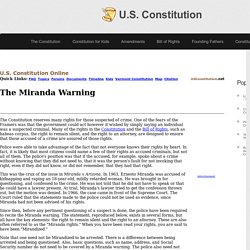
One of the fears of the Framers was that the government could act however it wished by simply saying an individual was a suspected criminal. Download Miranda Rights. Sponsored Links Your Miranda rights stem from the Fifth and Sixth Amendments to the U.S. Constitution, which, among other protections, assures your privilege against self-incrimination. Commentary: Seclusion and Restraint in Corrections—A Time for Change.
Michael K. Champion, MD + Author Affiliations Address correspondence to: Michael K. Quakers in the World - Reformers in Criminal Justice. Many Quakers have worked for reform of the criminal justice systems of their day. Quakers believe that people can always change: their focus has been on reforms that make positive change more likely, such as increased opportunities for education, improved prison conditions, help with facing up to violent impulses, and much else. Nowadays, restorative justice approaches are a central focus. BOP: Inmate Custody and Care. Prison Classification & Reclassification, Custody Placement and Risk Assessment.
By insideprison.com, April 2006 Proper classification is crucial to the efficient and safe operation of any prison facility. Offenders are heterogeneous, and possess a variety of behavioural styles and treatment needs, in varying states of mental health. Because many prisoners are incompatible with either their immediate prison environment or the people they share their living space with, proper classification can reduce prison infractions and maintain a safer environment for both inmates and staff. Because intake units face both a large number and a large variety of cases, and because the law requires institutions to administer the least restrictive form of punishment to an offender while securing his or her safety, objective classification measures are used. Not only can proper, evidence-based placement reduce the number of inmates in expensive maximum-security facilities, but it can also reduce the escape risk by placing offender only in compatible environments.
Initial Assessment. Specialized Courts. The scope of criminal court research and evaluation has grown with the advent of specialized or problem-solving courts. Examples of specialized courts include drug courts, mental health courts, domestic violence courts and reentry courts. Specialized courts differ from traditional courts in that they focus on one type of offense or offender. Usually the judge plays an intensive supervisory role. Other criminal justice components (e.g., probation) and social services agencies (e.g., drug treatment) are involved and collaborate closely in case processing. Most specialized court programs are motivated by two sets of goals: